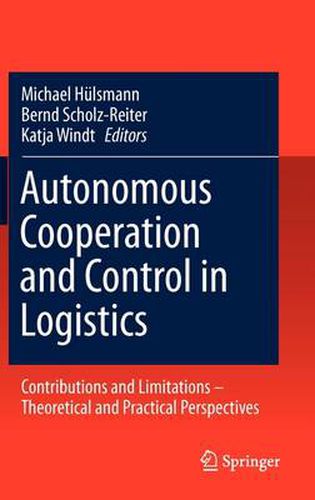Readings Newsletter
Become a Readings Member to make your shopping experience even easier.
Sign in or sign up for free!
You’re not far away from qualifying for FREE standard shipping within Australia
You’ve qualified for FREE standard shipping within Australia
The cart is loading…






This title is printed to order. This book may have been self-published. If so, we cannot guarantee the quality of the content. In the main most books will have gone through the editing process however some may not. We therefore suggest that you be aware of this before ordering this book. If in doubt check either the author or publisher’s details as we are unable to accept any returns unless they are faulty. Please contact us if you have any questions.
Many new technologies - like RFID, GPS, and sensor networks - that dominate innovative developments in logistics are based on the idea of autonomous cooperation and control. This self-organisational concept describes …processes of decentralized decision-making in heterarchical structures. It presumes interacting elements in non-deterministic systems, which possess the capability and possibility to render decisions. The objective of autonomous cooperation and control is the achievement of increased robustness and positive emergence of the total system due to distributed and flexible coping with dynamics and complexity (Hulsmann & Windt, 2007). In order to underlie these technology-driven developments with a fundamental theoretical foundation this edited volume asks for contributions and limitations of applying the principles of autonomous cooperation and control to logistics processes and systems. It intends to identify, describe, and explain - in the context of production and distribution logistics - the effects on performance and robustness, the enablers and impediments for the feasibility, the essential cause-effect-relations, etc. of concepts, methods, technologies, and routines of autonomous cooperation and control in logistics. Therefore, the analyses collected in this edited volume aim to develop a framework for finding the optimal degree as well as the upper and lower boundaries of autonomous cooperation and control of logistics processes from the different perspectives of production technology, electronics and communication engineering, informatics and mathematics, as well as management sciences and economics.
$9.00 standard shipping within Australia
FREE standard shipping within Australia for orders over $100.00
Express & International shipping calculated at checkout
This title is printed to order. This book may have been self-published. If so, we cannot guarantee the quality of the content. In the main most books will have gone through the editing process however some may not. We therefore suggest that you be aware of this before ordering this book. If in doubt check either the author or publisher’s details as we are unable to accept any returns unless they are faulty. Please contact us if you have any questions.
Many new technologies - like RFID, GPS, and sensor networks - that dominate innovative developments in logistics are based on the idea of autonomous cooperation and control. This self-organisational concept describes …processes of decentralized decision-making in heterarchical structures. It presumes interacting elements in non-deterministic systems, which possess the capability and possibility to render decisions. The objective of autonomous cooperation and control is the achievement of increased robustness and positive emergence of the total system due to distributed and flexible coping with dynamics and complexity (Hulsmann & Windt, 2007). In order to underlie these technology-driven developments with a fundamental theoretical foundation this edited volume asks for contributions and limitations of applying the principles of autonomous cooperation and control to logistics processes and systems. It intends to identify, describe, and explain - in the context of production and distribution logistics - the effects on performance and robustness, the enablers and impediments for the feasibility, the essential cause-effect-relations, etc. of concepts, methods, technologies, and routines of autonomous cooperation and control in logistics. Therefore, the analyses collected in this edited volume aim to develop a framework for finding the optimal degree as well as the upper and lower boundaries of autonomous cooperation and control of logistics processes from the different perspectives of production technology, electronics and communication engineering, informatics and mathematics, as well as management sciences and economics.